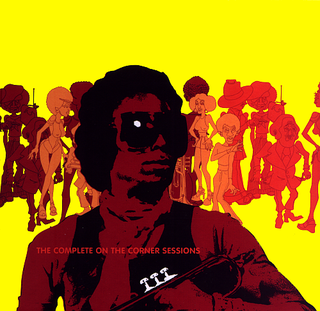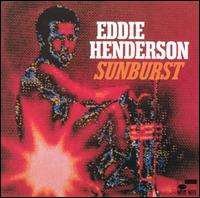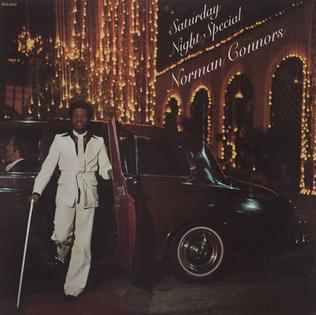
Herbert Jeffrey Hancock is an American jazz musician, bandleader, and composer. He started his career with trumpeter Donald Byrd's group. Hancock soon joined the Miles Davis Quintet, where he helped to redefine the role of a jazz rhythm section and was one of the primary architects of the post-bop sound. In the 1970s, he experimented with jazz fusion, funk, and electro styles using a wide array of synthesizers and electronics. It was during this time that he released one of his best-known and most influential albums, Head Hunters.

Head Hunters is the twelfth studio album by American pianist, keyboardist and composer Herbie Hancock, released October 26, 1973, on Columbia Records. Recording sessions for the album took place in the evening at Wally Heider Studios and Different Fur Trading Co. in San Francisco, California.

Bennie Maupin is an American jazz multireedist who performs on various saxophones, flute, and bass clarinet.

The Headhunters are an American jazz fusion band formed by Herbie Hancock in 1973. The group fused jazz, funk, and rock music.

Sextant is the eleventh studio album by Herbie Hancock, released in 1973 by Columbia. It is the last album with the Mwandishi-era sextet featuring saxophonist Bennie Maupin, trumpeter Eddie Henderson, trombonist Julian Priester, bassist Buster Williams and drummer Billy Hart. Synthesizer player Patrick Gleeson and percussionist Buck Clarke also appear.

Mwandishi is the ninth album by jazz pianist Herbie Hancock, released in 1971. It is the first album to officially feature Hancock’s ‘Mwandishi’ sextet consisting of reed player Bennie Maupin, trumpeter Eddie Henderson, trombonist Julian Priester, bassist Buster Williams and drummer Billy Hart.

Thrust is the fourteenth studio album by American jazz-funk musician Herbie Hancock, released in September 1974 on Columbia Records. The album reached No. 2 on the Billboard Top Soul Albums chart and No. 13 on the Billboard 200 chart. It is the second album featuring The Headhunters: saxophonist Bennie Maupin, bass guitarist Paul Jackson, drummer Mike Clark and percussionist Bill Summers.

Man-Child is the fifteenth studio album by jazz pianist Herbie Hancock. The record was released on August 22, 1975 by Columbia Records. It was the final studio album to feature The Headhunters, and a number of guest musicians including saxophonist Wayne Shorter, a full brass section, three different guitarists, and Stevie Wonder on harmonica.

The Complete On the Corner Sessions is a posthumous box set by American jazz musician Miles Davis, released in the US on September 25, 2007, by Columbia Records and in the UK on September 29 on Legacy Recordings. Like other Davis box sets, the included material is taken from a wider chronology of sessions than the dates which actually produced the titular album. The Complete On the Corner Sessions compiles material from 1972 through 1975 which, due to lineup changes Davis made throughout the era, features over two dozen musicians.

Fat Albert Rotunda is the eighth album by jazz keyboardist Herbie Hancock, released in 1969. It was Hancock's first release for Warner Bros. Records after his departure from Blue Note Records. The music was originally done for the TV special Hey, Hey, Hey, It's Fat Albert, which later inspired the Fat Albert and the Cosby Kids TV show.

V.S.O.P. is a 1977 double live album by keyboardist Herbie Hancock, featuring acoustic jazz performances by the V.S.O.P. Quintet, along with jazz fusion/jazz-funk performances by the ‘Mwandishi’ band and The Headhunters.

Flood is the second live album, and sixteenth album overall, by American jazz pianist and keyboardist Herbie Hancock. Recorded live in Tokyo, the album was originally released exclusively in Japan in 1975 as a double LP 洪水, reads kōzui meaning flood. It features The Headhunters performing selections from the albums Maiden Voyage, Head Hunters, Thrust, and Man-Child –– with the latter album still two months away from release at the time of these concerts.
Patrick Gleeson is an American musician, synthesizer pioneer, composer, and producer.

Sunburst is an album by American jazz trumpeter Eddie Henderson recorded in 1975 and released on the Blue Note label.

The Jewel in the Lotus is the debut album by jazz woodwind player Bennie Maupin, recorded in March 1974 and released on ECM later that year. The sextet's rhythm section consists of pianist Herbie Hancock, bassist Buster Williams and percussionists Billy Hart, Freddie Waits and Bill Summers, with guest appearances from trumpeter Charles Sullivan. The title is a translation of the Buddhist mantra Oṃ maṇi padme hūṃ.

Slow Traffic to the Right is the second album by jazz woodwind player Bennie Maupin, released in 1977.

Saturday Night Special is an album by the Philadelphia, Pennsylvania jazz drummer Norman Connors.

Inside Out is an album by American jazz trumpeter Eddie Henderson recorded in 1973 and released on the Capricorn label.

Realization is the debut album by American jazz trumpeter Eddie Henderson recorded in 1973 and released on the Capricorn label.

Mahal is an album by American jazz trumpeter Eddie Henderson. It was recorded in 1978, his second album released on the Capitol label.



















